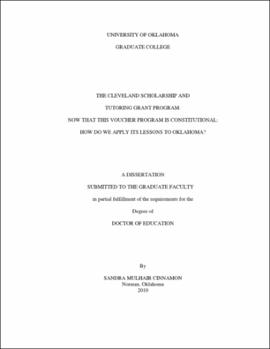| dc.contributor.advisor | Gutierrez, Kathrine | |
| dc.creator | Cinnamon, Sandra Mulhair | |
| dc.date.accessioned | 2019-04-27T21:35:16Z | |
| dc.date.available | 2019-04-27T21:35:16Z | |
| dc.date.issued | 2010 | |
| dc.identifier | 99315510902042 | |
| dc.identifier.uri | https://hdl.handle.net/11244/319077 | |
| dc.description.abstract | The purpose of the study was to research and discuss if: (a) a voucher program is legal in the state of Oklahoma; (b) if legal, would parents use vouchers; and (c) what would impact parents' attitude to use vouchers. The research of the legality of a voucher program was conducted under the framework of the Oklahoma Constitution, statutes, and caselaw. To determine if the parents would use vouchers to a secular or non-secular private school, questionnaires were sent out to three middle schools listed as a failing school on the Oklahoma State Department of Education's 2008 - 2009 School Improvements List under the No Child Left Behind Act, 70 U.S.C. § 6301 (2001). The completed questionnaires were analyzed and the finding was that parents would use vouchers. However, the data showed that the distance to the private school from the child's home, having to pay tuition or other costs, and the need for the private schools to be associated with a variety of religions would preclude parents from using vouchers. | |
| dc.format.extent | 167 pages | |
| dc.format.medium | application.pdf | |
| dc.language | en_US | |
| dc.relation.requires | Adobe Acrobat Reader | |
| dc.subject | Educational vouchers--Law and legislation--Oklahoma | |
| dc.subject | Educational vouchers--Oklahoma--Public opinion | |
| dc.subject | Parents--Oklahoma--Attitudes | |
| dc.subject | Public opinion--Oklahoma | |
| dc.title | The Cleveland Scholarship and Tutoring Grant Program: Now That This Voucher Program is Constitutional; How do We Apply its Lessons to Oklahoma | |
| dc.type | text | |
| dc.type | document | |
| dc.thesis.degree | Ed.D. | |
| ou.group | Jeannine Rainbolt College of Education::Department of Educational Leadership and Policy Studies | |
